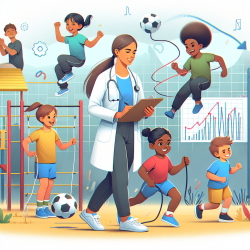Introduction
In the realm of speech-language pathology, understanding the complex interplay between childhood ADHD and co-occurring internalizing and externalizing problems is crucial for developing effective interventions. The recent study, "Childhood ADHD With and Without Co-occurring Internalizing/Externalizing Problems: Prospective Predictions of Change in Adolescent Academic and Social Functioning," offers valuable insights that can guide practitioners in enhancing their skills and outcomes for children.
Key Findings from the Study
The study, conducted by Reinke, Stiles, and Lee (2023), involved a longitudinal assessment of 182 children aged 5 to 11 years, with and without ADHD, over a period of 6 to 7 years. The research aimed to evaluate how childhood anxiety, depression, and aggression predict changes in academic and social outcomes during adolescence.
Key findings include:
- Childhood ADHD was inversely related to academic competence, highlighting the need for targeted academic interventions.
- Depression and aggression were significant predictors of declining friendship quality, emphasizing the importance of addressing these issues in social skills training.
- Anxiety did not significantly impact academic or friendship outcomes, suggesting that interventions may need to focus more on depression and aggression in these contexts.
Implications for Practitioners
For practitioners in speech-language pathology, these findings underscore the importance of a comprehensive approach that considers the multifaceted nature of ADHD and its co-occurring problems. Here are some actionable steps practitioners can take:
- Targeted Interventions: Develop interventions that specifically address academic competence in children with ADHD. This may include strategies to enhance attention, organization, and task completion.
- Social Skills Training: Incorporate social skills training that focuses on improving friendship quality, particularly for children exhibiting depressive and aggressive behaviors.
- Holistic Assessment: Conduct thorough assessments that consider both internalizing and externalizing problems, as well as their impact on academic and social functioning.
- Collaboration with Schools: Work closely with educators to implement school-based approaches that support children with ADHD and co-occurring issues.
Encouraging Further Research
The study highlights the need for further research to explore the nuances of ADHD and its co-occurring problems. Practitioners are encouraged to engage in or support research initiatives that aim to refine intervention strategies and improve outcomes for children.
Conclusion
By integrating the insights from this study into practice, speech-language pathologists can enhance their ability to support children with ADHD and co-occurring problems, ultimately leading to better academic and social outcomes. For those interested in delving deeper into the research, the original paper can be accessed here: Childhood ADHD With and Without Co-occurring Internalizing/Externalizing Problems: Prospective Predictions of Change in Adolescent Academic and Social Functioning.










